Transferts monétaires et mobilité humaine
Les transferts monétaires sont souvent utilisés lors de crises afin de répondre aux besoins des personnes migrantes. Dans cette page, vous trouverez des ressources sur les transferts monétaires et la migration.

La Croix-Rouge se prépare à fournir une aide humanitaire aux migrant·es de la caravane sur le point de quitter le Honduras pour le Guatemala.
©Johannes Chinchilla / FICR.
Conflits, crises économiques et catastrophes sont autant de raisons ayant contraint des personnes à fuir et à traverser des frontières dans des conditions éprouvantes et risquées, en quête de sécurité et de moyens de subsistance. En 2020, le nombre de personnes déplacées de force s’est envolé au niveau sans précédent de plus de 80 millions de personnes, soit près du double du nombre enregistré il y a une dizaine d’année. Cette tendance s’aggrave et les effets du changement climatique menacent de déplacer jusqu’à 200 millions de personnes d’ici 2050.
L’assistance monétaire est de plus en plus utilisée afin de répondre aux besoins des personnes en situation de déplacement. On y a eu recours à grande échelle dans différents contextes de migration, en Europe en 2015 jusqu’au Venezuela pour « los caminantes ». Elle a également été utilisée dans d’autres crises migratoires, notamment en Amérique centrale, au Sahel, en Méditerranée et dans la Corne de l’Afrique. L’assistance monétaire est à l’heure actuelle l’une des principales formes d’aide apportée aux populations déplacées en Ukraine et dans les pays voisins.
Il existe une myriade de perspectives et de définitions concernant le mot « migrant·e » et la façon dont les humanitaires doivent agir. C’est pourquoi nous ne choisissons pas une définition unique pour le moment, étant donné que les discussions sur l’assistance monétaire et la migration en sont encore à leurs prémices et que le langage évolue encore.
Documenter et partager les données probantes donnera lieu à des interventions plus efficaces. Cette page contient une sélection de ressources utiles concernant la migration et le recours à l’assistance monétaire. Elle sera mise à jour au fil des discussions ayant lieu dans les espaces humanitaires des transferts monétaires.
Priorités actuelles
Afin de contribuer aux progrès relatifs à cet enjeu, nous nous engageons à :
- soutenir la création de données probantes aux niveaux régional et mondial ;
- contribuer aux solutions pratiques visant à mettre en œuvre les transferts monétaires auprès des personnes migrantes ;
- organiser des discussions sur les enjeux majeurs basées sur des données probantes.
Contenu récent
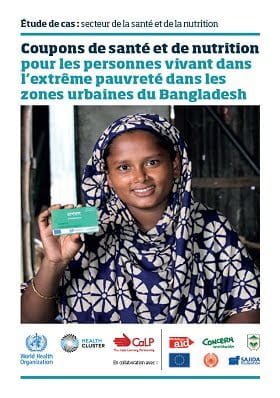
Coupons de santé et de nutrition pour les personnes vivant dans l’extrême pauvreté dans les zones urbaines du Bangladesh
Rapport
Cette étude porte sur l’utilisation expérimentale de coupons au Bangladesh par trois organisations, avec le soutien financier de l’Union européenne, pour répondre aux besoins de santé des populations vivant en zone urbaine dans une extrême pauvreté. Des partenariats public-privé ont pour but...
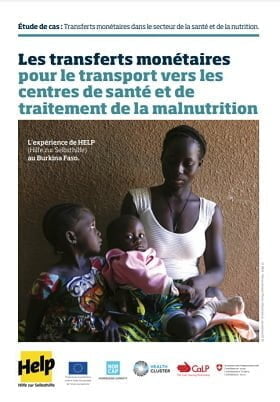
Les transferts monétaires pour le transport vers les centres de santé et de traitement de la malnutrition
Rapport
Cette étude de cas a été produite dans le cadre d’un projet de documentation des expériences de transferts monétaires dans le secteur de la santé, financé par l’Agence Suisse pour le Développement et la Coopération (SDC) et soutenu par le Cash Learning Partnership (the CALP Network),...

CVA for Health Outcomes: Learnings from Jordan, Burkina Faso and Bangladesh
Webinar
8:30 AM Burkina Faso ; 14:30 PM Bangladesh ; 9:30 AM UK; 11:30 AM Amman; 11:30 AM Addis

Toolkit for Monitoring and Evaluating Child Protection When Using Cash and Voucher Assistance
Guidelines and Tools
The Toolkit for Monitoring and Evaluating Child Protection when using Cash and Voucher Assistance (CP and CVA M&E Toolkit) is a resource for actors working in Monitoring and Evaluation, CVA (across sectors), and child protection. It aims to assess, address and monitor 1) Direct and indirect impact on...

Can Cash Transfers Help Syrian Refugees Manage Diabetes?
Blog Post
Shannon Doocy, Associate Professor in the Johns Hopkins Center for Humanitarian Health describes which combination of interventions resulted in the most effective diabetes treatment for Syrian refugees based in Jordan.

East and Southern Africa CWG leads and co-leads meeting
Event

Brief: Towards shock-responsive social protection: lessons from the COVID-19 response in Uganda
Policy paper
This policy brief presents highlights from the Uganda country case study on the social protection responses to COVID-19. The brief summarizes the key findings and sets out recommendations to strengthen the foundational social protection systems and enhance the ability of the sector to respond to future...
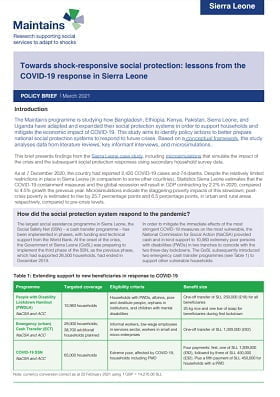
Brief: Towards shock-responsive social protection: lessons from the COVID-19 response in Sierra Leone
Policy paper
This policy brief sets out recommendations to strengthen the social protection sector’s capacity to deliver routine social protection, as well as respond to future shocks more effectively. The recommendations are drawn from key learnings from the country research report and accompanying microsimulation...
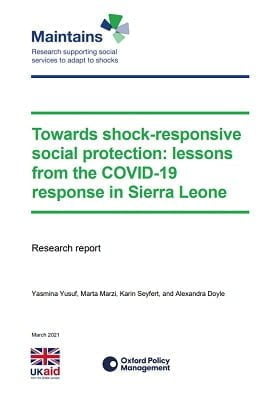
Towards shock-responsive social protection: lessons from the COVID-19 response in Sierra Leone
Report
Despite the relatively limited restrictions in place in Sierra Leone to contain the spread of COVID-19, the pandemic is likely to have a staggering impact on poverty. This report documents how the Government of Sierra Leone used social protection programmes to mitigate the negative impact of the pandemic...

Towards Shock-responsive Social Protection: Estimates from the COVID-19 Microsimulation in Pakistan
Case Study
This report presents the methodology and results of a microsimulation based on a partial equilibrium modelling framework using nationally representative household-level data for Pakistan. The findings include an estimate of the potential impact of COVID-19 on poverty in the country based on a model that...
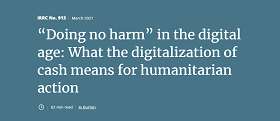
“Doing no harm” in the digital age: What the digitalization of cash means for humanitarian action
Policy paper
Cash transfers have changed the way the humanitarian sector delivers assistance, and at the same time, digitalization is changing the way our world works in fundamental ways. The digitalization of cash means that the simple click of a button can put money in the hands of hundreds of thousands, if not...

Formation à distance : Introduction à la protection sociale et sa pertinence en matière d’assistance humanitaire.
Formation
A propos de la formation Cette session fait partie du module de formation du CALP Network sur la protection sociale. Elle s’inscrit en préparation obligatoire à une session technique plus approfondie qui a été conçue spécifiquement pour les techniciens chargés de la conception et de la mise en...

Cash Hub Webinar 19: Learning from COVID-19 response – The Use of Cash and Markets in the Red Cross Red Crescent Movement
Members event
Since the outset of COVID-19 response many Red Cross Red Crescent National Societies (NS) have increased their use of Cash and Voucher Assistance (CVA). In this Webinar the Sierra Leone Red Cross and Pakistan Red Crescent Society will share information on their programmes, their challenges and learning.

Leaving No One Behind: Leveraging partnerships, technology and trust in cash-based interventions in the Syria response
Members event
Side event: Brussels V conference. With food insecurity reaching record levels in the region, the event will showcase cash transfers as an effective modality of assistance for refugees, displaced persons and other vulnerable populations in achieving food security and related sector outcomes. Co-Hosts: WFP...

Data Responsibility in Cash and Voucher Assistance – a toolkit for 2021
Blog Post
Linda Raftree, author of the CALP Network’s ‘Data Responsibility Toolkit for CVA Practitioners’, tells us about this new publication and what it means for people working in the field of cash and voucher assistance (CVA).
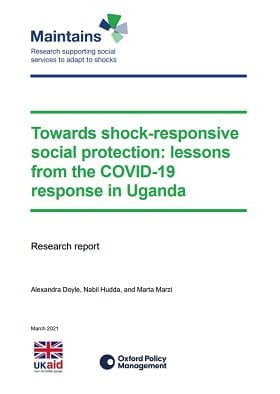
Towards shock-responsive social protection: lessons from the COVID-19 response in Uganda
Report
The stringent lockdown measures and global economic slowdown, due to COVID-19, are likely to have a large impact on poverty in Uganda. This report documents how the Government of Uganda plans to implement an Urban Cash for Work Programme to mitigate the impact of the pandemic on vulnerable populations....
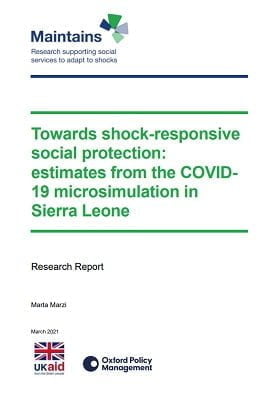
Towards shock-responsive social protection: lessons from the COVID-19 response in Sierra Leone: Estimate from the microsimulation
Report
This report presents the methodology and results of a microsimulation based on a partial equilibrium modelling framework using nationally representative household-level data for Sierra Leone. The findings include an estimate of the potential impact of COVID-19 on poverty in the country based on a model...

CVA, plus information: what happens when cash recipients are kept in the loop?
Blog Post
Max Seilern and Hannah Miles from Ground Truth Solutions reveal the positive impacts of simply being more open about cash programming with cash recipients.
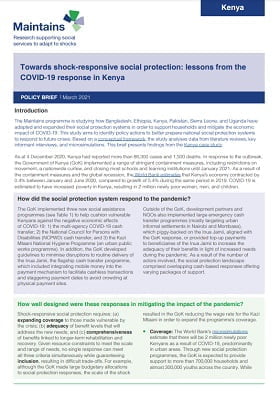
Brief: Towards shock-responsive social protection: lessons from the COVID-19 response in Kenya
Policy paper
This policy brief summaries the key findings and recommendations from the Kenya country case study on the social protection responses to COVID-19. The brief provides an analysis of the key enablers and constraints to the effective delivery of the social protection response in Kenya. The brief also...

Data simplified. Protection amplified. An essential conversation for CVA practitioners.
Webinar recording
As humanitarian aid becomes increasingly remote and digitized in the pandemic, and data is both a commodity and a weapon, how do we protect those we aim to help? More than ever, data must be treated as an extension of the individual and as an essential part of humanitarian protection. the CALP...